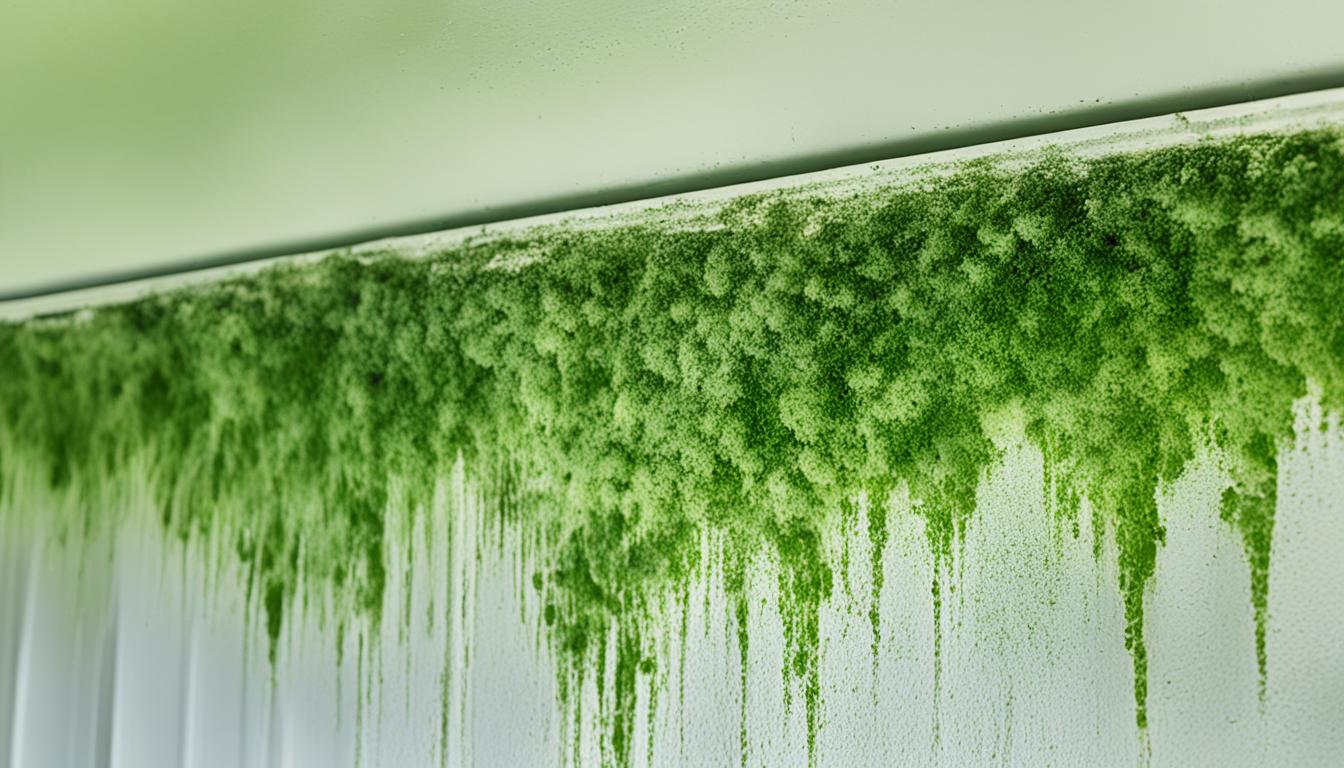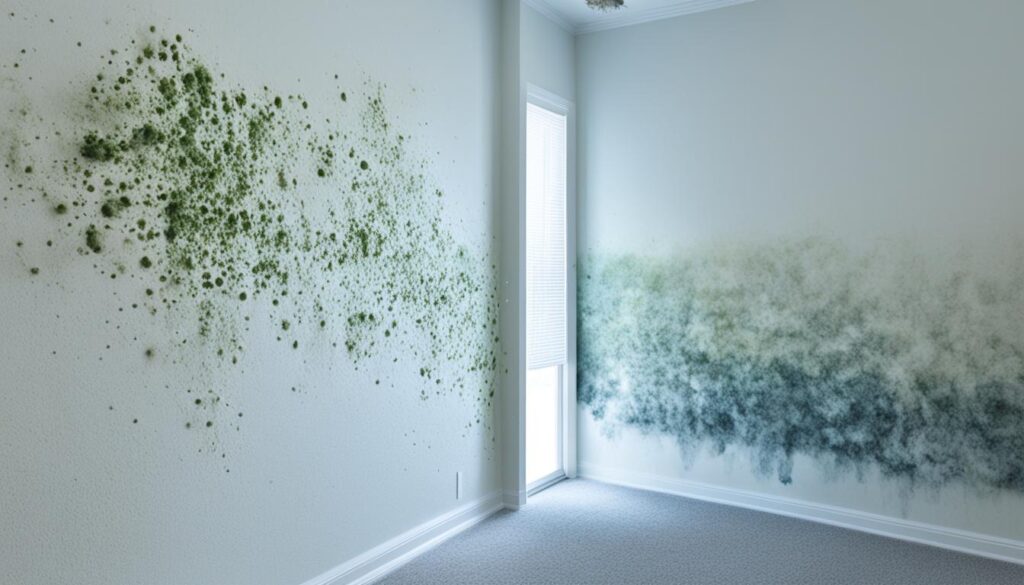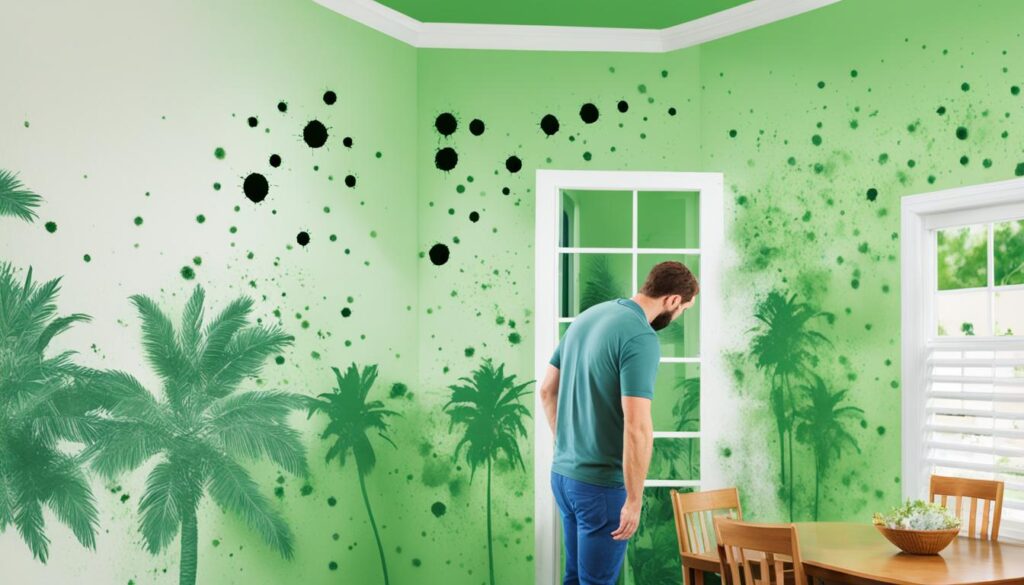
Health Risks of Mold Exposure in Florida
Welcome to our informative article on the health risks of mold exposure in Florida. As a state known for its warm weather and humidity, Florida residents face unique challenges when it comes to mold growth and its impact on respiratory health. In this article, we will explore the specific risks associated with mold exposure in Florida and discuss ways to mitigate these risks for a healthier living environment.
Key Takeaways:
- Mold exposure in Florida poses significant health risks to respiratory health and allergies.
- The warm and humid climate creates an ideal environment for mold growth in Florida.
- Mold exposure can lead to respiratory symptoms such as coughing, wheezing, and aggravation of asthma.
- Allergies to mold can cause nasal congestion, sneezing, and skin irritation.
- Professional mold assessments, prevention measures, and remediation services are essential for minimizing mold-related health risks.
Understanding the Effects of Mold on Respiratory Health
Mold exposure can have detrimental effects on respiratory health, causing a range of symptoms and potentially worsening existing conditions. In Florida, where the climate and environmental factors contribute to mold growth, individuals are at a higher risk of experiencing respiratory issues due to mold exposure. The combination of high humidity, warm weather, and potential water damage creates an ideal environment for mold to thrive and spread.
Respiratory health problems associated with mold exposure can include:
- Coughing: Mold spores in the air can irritate the respiratory tract, leading to persistent coughing.
- Wheezing: Mold can cause inflammation in the airways, resulting in wheezing and difficulty breathing.
- Asthma exacerbation: For individuals with asthma, mold exposure can trigger asthma attacks and worsen symptoms.
It is important to note that the effects of mold on respiratory health can vary from person to person, with some individuals being more sensitive or susceptible to mold-related respiratory issues than others.
In order to minimize the risks posed by mold exposure, it is crucial to address any existing mold problems promptly and take preventative measures to discourage mold growth. This can include:
- Controlling humidity levels in the home through proper ventilation and the use of dehumidifiers.
- Repairing any leaks or water damage that could contribute to mold growth.
- Regularly cleaning and maintaining areas prone to moisture, such as bathrooms and basements.
- Ensuring proper ventilation in areas with high moisture, such as kitchens and bathrooms.
In cases where mold growth is extensive or difficult to address, it is recommended to seek professional mold remediation services. By taking proactive steps to prevent and address mold issues, individuals can safeguard their respiratory health and reduce the potential risks associated with mold exposure.
The True Cost of Mold Exposure
“Mold exposure can lead to long-term health consequences if left unaddressed. It’s important to prioritize respiratory health and understand the risks associated with mold exposure, especially in environments prone to mold growth like Florida. By taking preventative measures and seeking professional assistance when needed, individuals can ensure a healthier living environment.” – Dr. Emily Johnson, Allergy and Asthma Specialist.

| Respiratory Symptoms | Prevalence |
|---|---|
| Coughing | 80% |
| Wheezing | 76% |
| Asthma exacerbation | 85% |
Allergies and Mold in Florida
Exposure to mold can have a significant impact on allergies, exacerbating symptoms and causing discomfort. In Florida, where the warm climate and high humidity create ideal conditions for mold growth, individuals with allergies must be particularly vigilant.
Allergies to mold can manifest in various ways, affecting the respiratory system and skin. Common symptoms include:
- Nasal Congestion: Mold spores can irritate the nasal passages, leading to congestion and difficulty in breathing.
- Sneezing: Allergic reactions to mold often trigger frequent bouts of sneezing, disrupting daily routines.
- Skin Irritation: Direct contact with mold, especially certain types like black mold, can cause skin irritation and rashes.
It is important to note that exposure to mold can worsen existing allergies and asthma symptoms, making it crucial for individuals in Florida, where mold exposure is more prevalent, to take necessary precautions.
Prevalence of Mold Allergies in Florida
Given Florida’s warm and humid climate, mold growth is a common issue in many households and buildings throughout the state. As a result, mold allergies are also more prevalent among the population.
A study conducted by the University of Central Florida found that approximately 40% of Floridians suffer from some form of mold allergy. This high prevalence underscores the need for increased awareness and proactive measures to minimize exposure.
Minimizing Mold Exposure for Allergy Sufferers
If you have allergies and live in Florida, there are steps you can take to minimize your exposure to mold:
- Keep indoor humidity levels below 50%:
- Address any water leaks or moisture issues promptly:
- Ensure proper ventilation in bathrooms and kitchens:
- Clean and dry damp areas regularly:
- Use a dehumidifier in areas prone to excess moisture:
- Regularly clean and replace air filters in HVAC systems:
- Consider professional mold inspections:
By implementing these preventive measures, you can significantly reduce the risk of mold exposure and alleviate the symptoms associated with mold allergies.

“Minimizing mold exposure is crucial for individuals with allergies, particularly in a state like Florida where the climate fosters mold growth. By taking proactive steps and ensuring a safe living environment, allergy sufferers can enjoy better respiratory health and overall well-being.” – Dr. Emily Thompson, Allergy Specialist
Conclusion
Recognizing and addressing mold issues in Florida is of utmost importance for the sake of respiratory health and allergy prevention. The unique climate and environmental factors in Florida contribute to the growth of mold, posing significant risks to individuals living in the state.
To effectively combat mold, it is crucial to seek professional mold assessments to identify the extent of the problem. These assessments can provide valuable insights into the underlying causes and guide appropriate remediation efforts.
Prevention measures are equally vital in minimizing the risk of mold growth. Proper ventilation, regular inspections for water leaks or damage, and prompt repairs are key to maintaining a mold-free environment. Professionals such as Fix Mold Miami have the expertise to implement preventive measures and carry out effective mold remediation services.
For reliable mold-related services in Florida, Fix Mold Miami is a reputable company that specializes in mold assessments, prevention strategies, and remediation. Their team of experts can help ensure a healthy and mold-free environment, protecting respiratory health and preventing allergies.




